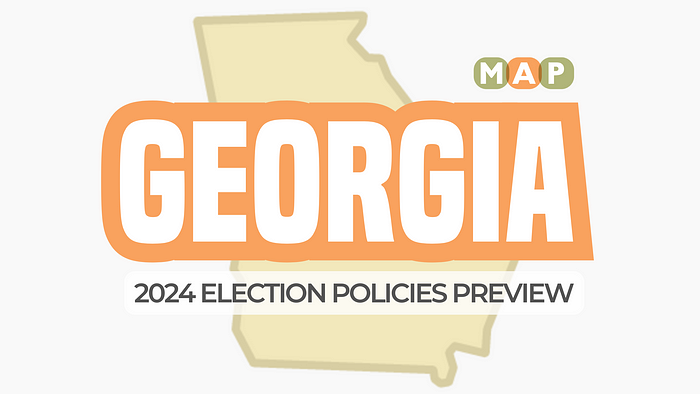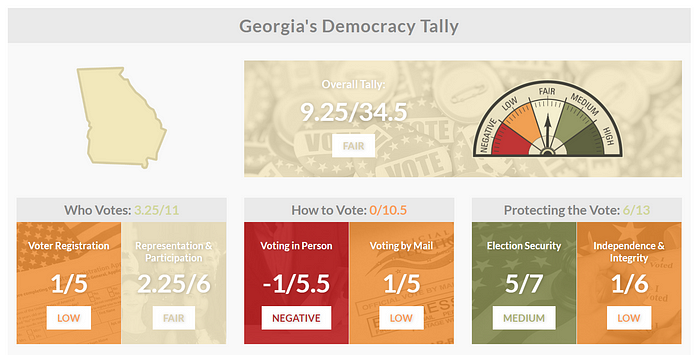Voting and Elections
2024 Election Policies Preview: Georgia

Note: On October 15, a Georgia trial court issued an order that temporarily blocked the hand counting rule passed by the state Election Board from going into effect. An appeal is possible in the case, but if the ruling remains in place, the hand counting rule will not impact this year’s election.
In advance of November’s election, MAP’s new “Election Policies Preview” series details voting and election policies in key states, including policies that impact who votes, policies that impact how to vote, and policies that protect the vote. This week, we are beginning the series with Georgia.
Quick Facts About Georgia
- Democracy Tally — 39th in the U.S. for voting and election policies
- 2020 Voter Registration Rate — 87.5%
- 2020 Presidential Election Voter Turnout Percentage — 68%
- 2020 Presidential Election Vote Margins — 11,779 votes (0.2%)
- 2020 Presidential Election Youth Voter Turnout — 51%
- 2022 Midterms Youth Voter Turnout — 26%

Georgia’s Voting and Election Policies
Policies Impacting Who Votes
The Democracy Maps track policies related to voter eligibility and registration under the category of Who Votes. This category includes policies such as automatic and online voter registration, which work to determine the eligible electorate in each state. Who Votes also includes policies related to representation and participation, including rights restoration for formerly incarcerated people and the partisanship of state primary systems.
Automatic Voter Registration
Georgia is one of 24 states that has some form of automatic voter registration. Specifically, Georgia uses partial, or front-end, AVR, which allows the voter an opportunity to opt-out of being registered at the time of the relevant agency transaction. Partial AVR is an improvement over traditional registration systems but is relatively less efficient than Secure AVR. Notably, this year Georgia lawmakers attempted to advance legislation to repeal the AVR system, despite the fact that AVR is proven to significantly increase registration rates.
Voting Rights for Formerly Incarcerated People
Georgia is one of 15 states that requires formerly incarcerated people to complete all terms of their sentence before rights are restored, including probation and parole. These rights restoration policies rely on systems that are very difficult to navigate and also prevent indigent individuals from regaining their voting rights. According to the Sentencing Project, over 3% of Georgia’s voting age population is currently denied the right to vote due to a prior felony conviction, representing over 234,000 citizens.
Policies Impacting How to Vote
The Democracy Maps track policies related to in-person and mail voting methods under the category of How to Vote. This category includes policies like early voting, voter ID requirements, and the availability of absentee or mail voting.
Voter ID Laws
Georgia is one of 11 states with a strict photo ID requirement, the most restrictive categorization in our policy tracking. Voters in Georgia without an acceptable ID are forced to cast a provisional ballot, and then must appear in person at the registrar’s office within 3 days after the election to present acceptable ID, or their ballot will not be counted. These unnecessarily strict requirements have been shown to disproportionately impact voters of color, as well as transgender voters.
Access to Ballot Boxes
Georgia is one of five states that allow the use of drop boxes but place unnecessary restrictions on their availability, even though they have long been used as a secure option for voters to return their ballots. As part of broad restrictive legislation passed in 2021, the state severely limited the number of drop boxes allowed per county and the hours they are available, as well as requiring them to be located inside election offices. According to NPR, these restrictions have resulted in a significant reduction in the number of drop boxes in the largest counties in the state, where roughly 50% of voters are people of color.
Policies Protecting the Vote
The Democracy Maps track policies related to the independence, integrity and security of elections under the Protecting the Vote category. This category includes policies related to security like post-election audits, and policies such as laws allowing state legislatures to interfere in election administration that harm the independence and integrity of elections.
Post-Election Audits
Georgia is one of 41 states that require the use of a post-election audit. Georgia is also one of 13 states that utilize best practice risk-limiting audits. Properly conducted, nonpartisan audits provide public confidence in election results and can also act as a safeguard against hacking and foreign interference. Following the 2020 election, officials in Georgia conducted risk-limiting audits which affirmed the accuracy and legitimacy of results in the state amid a climate of election denialism and attempts by President Trump to overturn the results.
State Legislature Interference in Election Administration
Georgia is one of nine states that have passed laws since 2020 allowing the partisan legislature to interfere in election administration. Legislation passed in the state in 2021 removed the Secretary of State as the head of the state Election Board, allowing the legislature to reject emergency election regulations, in addition to allowing the reconstituted Election Board to take power over county election authorities. These laws increase the danger of election subversion and feed into the growing election denialism movement. The changes to the state Election Board have already had negative consequences with the board passing harmful rules to allow local officials to subvert the certification process and requiring counties to conduct full hand counts of ballots.

Following the razor thin margins in the 2020 Presidential election in Georgia, and attempts by President Trump to overturn the legitimate results, Georgia continues to be a focal point for election denialism and partisan attempts to subvert the will of the people. In particular, the state Election Board, which was recently taken over by a majority of election deniers, has passed a number of controversial rules much closer to the election than is customary. These new rules include granting local election boards the power to disrupt the certification process and requiring counties to conduct burdensome and error prone hand counts of ballots. With these changes, it is safe to expect delays in the vote counting process and controversy around certifying election results in Georgia this November.
